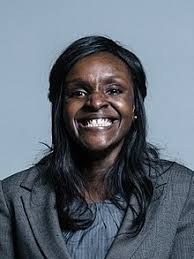Peterborough MP turned gaol-bird Fiona Onasanya who was recently sentenced to 12 weeks imprisonment for perverting the course of justice over a road traffic offence, has by her latest alleged actions, shown she is a woman devoid of any sense of honour. Despite calls to step down following her conviction made by both the ruling Conservative Party and her own opposition Labour Party, she still wants to hang on to her Parliamentary seat.
To be honest I can see her reasoning for this, she believes that she was treated harshly by the courts and is embarking on an appeal against conviction, but it is a course of action that leaves a bad taste in the mouth. If nothing else it shows that Fiona Onasanya has no sense that she should do what’s best for her constituents or her party and is incapable of doing what can be readily seen as the honourable thing and resign. Whilst incarcerated in gaol she will continue to draw her Parliamentary salary even though she is not in any way shape or form able to represent her constituents whilst she is in prison. After all how are those she is supposed to get to see her to discuss constituency business, wait until she sends them a prison Visitor Order?
Fiona Onasanya has to my mind behaved disgracefully throughout the whole episode that led her to be gaoled. She not only lied on official documents about her speeding but attempted to pin the blame on an innocent person. She then went on to plead not guilty to perverting justice and by doing so incurred the costs of not one but two Crown Court trials, her original trial and the retrial that was ordered when the original jury could not agree to either convict or not convict.
It’s very interesting to compare Onasanya’s behaviour with that of another former MP who committed a similar offence, the Liberal Democrat cabinet minister Chris Huhne. Huhne may well have been a scumbag for trying to pin the blame for a speeding ticket on his ex wife Vicky Pryce, but at least Huhne had the decency to both plead guilty and resign his Parliamentary seat along with his position on the Privy Council. Onasanya doesn’t even have the decency to resign and the fact that she is appealing her conviction means that the voters of Peterborough are stuck with this dishonourable member for a long time to come. This is because although it is possible for a local petition to be set up to force a recall referendum, something that Labour have said they will not obstruct, this process cannot be put in motion until the appeal process is over.
Of course I can accept the due process aspects of this case, there is an appeal and she can’t be removed from her seat until the appeal is over, but the people of Peterborough should not be left without proper Parliamentary representation until due process is completed. A better person than Onasanya would have done the right thing and resigned to concentrate on their appeal and let their constituents move on and get another Member of Parliament. The fact that Fiona Onasanya has not gone down this route probably tells us a fair bit about her selfishness and sense of personal entitlement. I don’t know about you but if I was a voter in Peterborough I would not want to be represented in Parliament by such a grossly flawed character. I want,for the good of the political system, to see Fiona Onasanya resign, but she doesn’t seem to be showing signs at the time of writing that she will go. We have to therefore sadly assume that Ms Onasanya’s sense of decency and honour is missing presumed dead.





A number of factors apply here—and we have discarded so many good practices that once contributed to our formerly very successful society that it is difficult to know where to start, and it would take a lifetime fixing them even with someone in charge willing to grasp that nettle (more like a triffid at this point).
One issue is Onasanya’s origins—as the saying goes, ‘Import a Third World people, get Third World values’ (Nigeria scores 27/100 and ranks 144/180 on the 2018 Corruption Perceptions Index compared to Britain’s score of 80/100 and ranking of 11). If we don’t stop importing from the Third World, this corruption will increase.
A second issue is her being a child of divorce and raised by a single mother, numerous studies showing broken homes being a strong predictor of dysfunctionality. (A couple of links to kick off:
Howell, N. (2015) A Link Between Single Parent Families and Crime. Ed.D. Dissertations. Paper 79.
Smith, I.D. (2007) Being tough on the causes of crime: Tackling family breakdown to prevent youth crime. Centre for Social Justice.)
But lay that aside—is there anything we can do to improve the quality of our MPs?
Our mistake was starting to pay them in 1911. Since Simon de Montfort summoned the first Parliament at Westminster in 1265 (and from before that, Parliament’s origins lying in the 8th Century Saxon Witan and Moot) until 1911, its members sat without expectation of remuneration—and we had far better MPs when they enjoyed no salaries or expenses than ever since: J.S. Mill, Edmund Burke, radicals like William Cobbett, PMs such as Pitts Elder and Younger, Wellington, Peel, Palmerston, Salisbury, etc. Other than Winston, who have we had since that compares to those political titans?
With few opportunities to dip one’s snout into the taxpayers’ trough, entering politics was seen more as a service to one’s country. Being unsalaried, it required them to have actual talent: to make money (as ex-Sergeant Major Cobbett did, financing himself through his writing) or to convince a patron that they were worthy of their support (as Burke convinced Lord Verney and William Hamilton), or to have made their fortune before entering politics (such as successful naval officers rich from prizes, like Sir Edward Pellew—who some believe the inspiration for Patrick O’Brian’s Jack Aubrey).
MPs once saw their job as simply safely steering Plato’s ‘Ship of State’, taking in a reef here, setting full sail there, battening down the hatches and seeking safe harbour when necessary—not be forever trying to rebuild the entire ship from the keel up, as our MPs do now, seeking headlines for their latest whim to radically restructure our country. For many, being an MP was part-time (and being unpaid, the public little minded them taking long holidays or concentrating on their businesses), with MPs such as John Norris, who combined representing Rye (1708–22, 1734–49) and Portsmouth (1722–34) with a Royal Naval career, commanding operational cruises to the Baltic; and as I observed to you in an earlier comment, Admiral Thomas Cochrane (inspiration for C.S. Forester’s Hornblower) who led daring expeditions against Buonaparte’s forces in the Med while representing Westminster (1807–18). Now, our MPs constantly try to ‘be seen to do something’, perpetually passing new laws and regulations to nag us with.
If you want a better class of MP, stop paying them. N.b. This is only restoring a tried and tested solution, an established English then British practice that worked satisfactorily for centuries (to quote Cobbett: ‘We want great alteration, but we want nothing new.’).
Obviously there is no chance of our MPs voting themselves off the taxpayer-funded gravy train but I had a notion that might persuade. Propose replacing salaries and expenses with a form of internet crowdfunding using dedicated government servers; an MP would have an account and his constituents (only) could donate if they wished and as much as they wished. Sell idea to public on basis of savings (for UK, an annual minimum £181.6m); and to MPs by observing that they could potentially earn more money than currently (MP’s base salary £77,379). If but half an MP’s voters gave a mere £1 a month to the MP they elected (2017 results), Britain’s highest-paid politician would be George Howarth (Labour) who could be raking in £284,106 p/a (and possibly considerably more if >50% of those who voted for him donated and/or donated >£12 a year); the average Conservative MP’s annual income would be £175,295, Labour’s would be £168,091, Lib Dems on £135,332, SNP £103,257, and DUP on £130,918; our lowest paid MP would be Angus MacNeil (SNP) on a still respectable £36,078 p.a. And as noted, the earnings could be much, much more if more of their voters donated and/or donated more money. If a local MP is any use, why would their constituents not be willing to give them a measly quid a month—a paltry £12 a year?
…Although I am sure many MPs are elected only as the lesser of many evils or for the Party rosette they wear, and while people will throw a vote their way, few will chuck them even a measly quid and MPs will soon find themselves on their uppers—which is the point of the exercise.
Another selling point to both public and MPs is that it would serve as a running barometer measuring an individual MP’s popularity as distinguished from people voting for his party: it would enable Party supporters to instantly show displeasure with their MP by cancelling direct debits (better than a US-style ‘recall’ as an MP playing a long game could still weather short-term displeasure); and the more capable and ambitious of MPs would have a yardstick of their popularity to display to Party seniors; and MPs opposing the idea could be shamed: ‘Do your own voters hold you in such contempt that not even half will donate a measly quid a month to you? Are you really so hated by your own voters, that they would deny you an income?’ (likely true of many of the diversity-hires on shortlists).